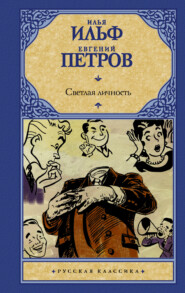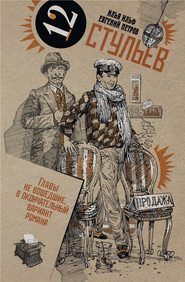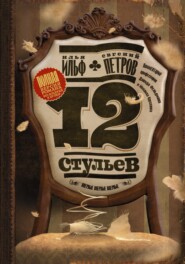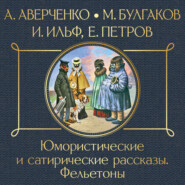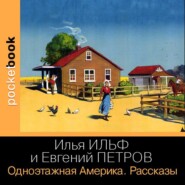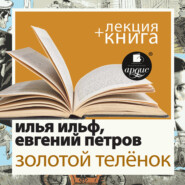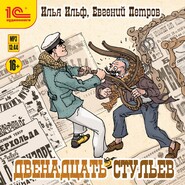По всем вопросам обращайтесь на: info@litportal.ru
(©) 2003-2025.
✖
The Twelve Chairs / Двенадцать стульев. Книга для чтения на английском языке
Автор
Жанр
Год написания книги
1928
Теги
Настройки чтения
Размер шрифта
Высота строк
Поля
«No. The member of the shop assistants' trade union».
«I don't get you».
«That's because you lack technical experience. Don't be naive!»
Bender took a union card out of his green jacket and handed it to Ippolit Matveyevich.
«Konrad Karlovich Michelson, aged forty-eight, non-party member, bachelor; union member since 1921 and a person of excellent character; a good friend of mine and seems to be a friend of children… But you needn't be friendly to children. The militia doesn't require that of you».
Ippolit Matveyevich turned red. «But is it right?»
«„Compared with our“ concession, this misdeed, though it does come under the penal code, is as innocent as a children's game».
Vorobyaninov nevertheless balked at the idea.
«You're an idealist, Konrad Karlovich. You're lucky, otherwise you might have to become a Papa Christosopulo or Zlovunov».
There followed immediate consent, and without saying goodbye to Tikhon, the concessionaires went out into the street.
They stopped at the Sorbonne Furnished Rooms. Ostap threw the whole of the small hotel staff into confusion. First he looked at the seven-rouble rooms, but disliked the furnishings. The cleanliness of the five-rouble rooms pleased him more, but the carpets were shabby and there was an objectionable smell. In the three-rouble rooms everything was satisfactory except for the pictures.
«I can't live in a room with landscapes», said Ostap.
They had to take a room for one rouble, eighty. It had no landscapes, no carpets, and the furniture was very conservative – two beds and a night table.
«Stone-age style», observed Ostap with approval. «I hope there aren't any prehistoric monsters in the mattresses».
«Depends on the season», replied the cunning room-cleaner. «If there's a provincial convention of some kind, then of course there aren't any, because we have many visitors and we clean the place thoroughly before they arrive. But at other times you may find some. They come across from the Livadia Rooms next door».
That day the concessionaires visited the Stargorod communal services, where they obtained the information they required. It turned out that the housing division had been disbanded in 1921 and that its voluminous records had been merged with those of the communal services.
The smooth operator got down to business. By evening the partners had found out the address of the head of the records department, Bartholomew Korobeinikov, a former clerk in the Tsarist town administration and now an office-employment official.
Ostap attired himself in his worsted waistcoat, dusted his jacket against the back of a chair, demanded a rouble, twenty kopeks from Ippolit Matveyevich, and set off to visit the record-keeper. Ippolit Matveyevich remained at the Sorbonne Hotel and paced up and down the narrow gap between the two beds in agitation. The fate of the whole enterprise was in the balance that cold, green evening. If they could get hold of copies of the orders for the distribution of the furniture requisitioned from Vorobyaninov's house, half the battle had been won. There would still be tremendous difficulties facing them, but at least they would be on the right track.
«If only we can get the orders», whispered Ippolit Matveyevich to himself, lying on the bed, «if only we can get them».
The springs of the battered mattress nipped him like fleas, but he did not feel them. He still only had a vague idea of what would follow once the orders had been obtained, but felt sure everything would then go swimmingly.
Engrossed in his rosy dream, Ippolit Matveyevich tossed about on the bed. The springs bleated underneath him.
Ostap had to go right across town. Korobeinikov lived in Gusishe, on the outskirts.
It was an area populated largely by railway workers. From time to time a snuffling locomotive would back its way along the walled-off embankment, above the houses. For a second the rooftops were lit by the blaze from the firebox. Now and then empty goods trains went by, and from time to time detonators could be heard exploding. Amid the huts and temporary wooden barracks stretched the long brick walls of still damp blocks of flats.
Ostap passed an island of lights-the railway workers' club-checked the address from a piece of paper, and halted in front of the record-keeper's house. He rang a bell marked «Please Ring» in embossed letters.
After prolonged questioning as to «Who do you want?» and «What is it about?» the door was opened, and he found himself in a dark, cupboard-cluttered hallway. Someone breathed on him in the darkness, but did not speak.
«Is Citizen Korobeinikov here?» asked Ostap.
The person who had been breathing took Ostap by the arm and led him into a dining-room lit by a hanging kerosene lamp. Ostap saw in front of him a prissy little old man with an unusually flexible spine. There was no doubt that this was Citizen Korobeinikov himself. Without waiting for an invitation, Ostap moved up a chair and sat down.
The old man looked fearlessly at the high-handed stranger and remained silent. Ostap amiably began the conversation.
«I've come on business. You work at the communal-services records office, don't you?»
The old man's back started moving and arched affirmatively.
«And you worked before that in the housing division?»
«I have worked everywhere», he answered gaily.
«Even in the Tsarist town administration?»
Here Ostap smiled graciously. The old man's back contorted for some time and finally ended up in a position implying that his employment in the Tsarist town administration was something long passed and that it was not possible to remember everything for sure.'
«And may I ask what I can do for you?» said the host, regarding his visitor with interest.
«You may», answered the visitor. «I am Vorobyaninov's son».
«Whose? The marshal's?»
«Yes».
«Is he still alive?»
«He's dead, Citizen Korobeinikov. He's gone to his rest».
«Yes», said the old man without any particular grief, «a sad event. But I didn't think he had any children».
«He didn't», said Ostap amiably in confirmation.
«What do you mean?»
«I'm from a morganatic marriage».
«Not by any chance Elena Stanislavovna's son?»
«Right!»
«How is she?»
«Mum's been in her grave some time».
«I see. I see. How sad».
And the old man gazed at Ostap with tears of sympathy in his eyes, although that very day he had seen Elena Stanislavovna at the meat stalls in the market.
«I don't get you».
«That's because you lack technical experience. Don't be naive!»
Bender took a union card out of his green jacket and handed it to Ippolit Matveyevich.
«Konrad Karlovich Michelson, aged forty-eight, non-party member, bachelor; union member since 1921 and a person of excellent character; a good friend of mine and seems to be a friend of children… But you needn't be friendly to children. The militia doesn't require that of you».
Ippolit Matveyevich turned red. «But is it right?»
«„Compared with our“ concession, this misdeed, though it does come under the penal code, is as innocent as a children's game».
Vorobyaninov nevertheless balked at the idea.
«You're an idealist, Konrad Karlovich. You're lucky, otherwise you might have to become a Papa Christosopulo or Zlovunov».
There followed immediate consent, and without saying goodbye to Tikhon, the concessionaires went out into the street.
They stopped at the Sorbonne Furnished Rooms. Ostap threw the whole of the small hotel staff into confusion. First he looked at the seven-rouble rooms, but disliked the furnishings. The cleanliness of the five-rouble rooms pleased him more, but the carpets were shabby and there was an objectionable smell. In the three-rouble rooms everything was satisfactory except for the pictures.
«I can't live in a room with landscapes», said Ostap.
They had to take a room for one rouble, eighty. It had no landscapes, no carpets, and the furniture was very conservative – two beds and a night table.
«Stone-age style», observed Ostap with approval. «I hope there aren't any prehistoric monsters in the mattresses».
«Depends on the season», replied the cunning room-cleaner. «If there's a provincial convention of some kind, then of course there aren't any, because we have many visitors and we clean the place thoroughly before they arrive. But at other times you may find some. They come across from the Livadia Rooms next door».
That day the concessionaires visited the Stargorod communal services, where they obtained the information they required. It turned out that the housing division had been disbanded in 1921 and that its voluminous records had been merged with those of the communal services.
The smooth operator got down to business. By evening the partners had found out the address of the head of the records department, Bartholomew Korobeinikov, a former clerk in the Tsarist town administration and now an office-employment official.
Ostap attired himself in his worsted waistcoat, dusted his jacket against the back of a chair, demanded a rouble, twenty kopeks from Ippolit Matveyevich, and set off to visit the record-keeper. Ippolit Matveyevich remained at the Sorbonne Hotel and paced up and down the narrow gap between the two beds in agitation. The fate of the whole enterprise was in the balance that cold, green evening. If they could get hold of copies of the orders for the distribution of the furniture requisitioned from Vorobyaninov's house, half the battle had been won. There would still be tremendous difficulties facing them, but at least they would be on the right track.
«If only we can get the orders», whispered Ippolit Matveyevich to himself, lying on the bed, «if only we can get them».
The springs of the battered mattress nipped him like fleas, but he did not feel them. He still only had a vague idea of what would follow once the orders had been obtained, but felt sure everything would then go swimmingly.
Engrossed in his rosy dream, Ippolit Matveyevich tossed about on the bed. The springs bleated underneath him.
Ostap had to go right across town. Korobeinikov lived in Gusishe, on the outskirts.
It was an area populated largely by railway workers. From time to time a snuffling locomotive would back its way along the walled-off embankment, above the houses. For a second the rooftops were lit by the blaze from the firebox. Now and then empty goods trains went by, and from time to time detonators could be heard exploding. Amid the huts and temporary wooden barracks stretched the long brick walls of still damp blocks of flats.
Ostap passed an island of lights-the railway workers' club-checked the address from a piece of paper, and halted in front of the record-keeper's house. He rang a bell marked «Please Ring» in embossed letters.
After prolonged questioning as to «Who do you want?» and «What is it about?» the door was opened, and he found himself in a dark, cupboard-cluttered hallway. Someone breathed on him in the darkness, but did not speak.
«Is Citizen Korobeinikov here?» asked Ostap.
The person who had been breathing took Ostap by the arm and led him into a dining-room lit by a hanging kerosene lamp. Ostap saw in front of him a prissy little old man with an unusually flexible spine. There was no doubt that this was Citizen Korobeinikov himself. Without waiting for an invitation, Ostap moved up a chair and sat down.
The old man looked fearlessly at the high-handed stranger and remained silent. Ostap amiably began the conversation.
«I've come on business. You work at the communal-services records office, don't you?»
The old man's back started moving and arched affirmatively.
«And you worked before that in the housing division?»
«I have worked everywhere», he answered gaily.
«Even in the Tsarist town administration?»
Here Ostap smiled graciously. The old man's back contorted for some time and finally ended up in a position implying that his employment in the Tsarist town administration was something long passed and that it was not possible to remember everything for sure.'
«And may I ask what I can do for you?» said the host, regarding his visitor with interest.
«You may», answered the visitor. «I am Vorobyaninov's son».
«Whose? The marshal's?»
«Yes».
«Is he still alive?»
«He's dead, Citizen Korobeinikov. He's gone to his rest».
«Yes», said the old man without any particular grief, «a sad event. But I didn't think he had any children».
«He didn't», said Ostap amiably in confirmation.
«What do you mean?»
«I'm from a morganatic marriage».
«Not by any chance Elena Stanislavovna's son?»
«Right!»
«How is she?»
«Mum's been in her grave some time».
«I see. I see. How sad».
And the old man gazed at Ostap with tears of sympathy in his eyes, although that very day he had seen Elena Stanislavovna at the meat stalls in the market.






